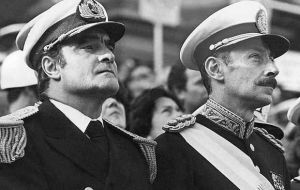MercoPress. South Atlantic News Agency
Argentina under Plan Condor had tracking stations in Brazil
 Former dictator Massera and Videla in the 1978
Former dictator Massera and Videla in the 1978 The 1976-1983 Argentine dictatorship held information bases in San Paulo and Rio de Janeiro, Brazil, which were meant to “detect people connected to the subversion”, according to a legal prosecution started in Argentina, reported the Folha de Sao Paulo newspaper on Sunday.
The probe, which investigated the existence of Argentine bases in neighboring countries during the 1970s and 80s under the framework of the Cóndor Plan, a military scheme organized by Latin American regimes in the 70s and 80s to eliminate political dissidents, was opened at the request of Argentina's prosecutor office. The case concluded last December 18, when one policeman and seven military officers, among them former Army commander Cristino Nicolaides, were convicted of human rights violations. The document, based on the testimony of the Argentine Army Intelligence Battalion 601 prison warden Néstor Norberto Cendón, revealed the Argentine bases were connected to this military unit, an interrogation and torture centre located in Buenos Aires city. The bases were in charge of intercepting members of the Montoneros guerilla group in foreign territory, and of keeping the Argentine military authorities informed of their movements. Cendón declared the Army's intelligence also had bases in Bolivia, Paraguay and Uruguay as part of a military operation against the Montoneros, called "Murciélago," as part of the Cóndor Plan. A week ago, another Brazilian newspaper, O Estado de Sao Paulo, published declarations by General Agnaldo Del Nero Augusto admitting the neighboring country's collaboration in the detention of Argentine and other leftist militants as part of the Cóndor Plan. Del Nero Augusto denied that Argentine detainees had been killed by his government but admitted Brazil's collaboration in intelligence and training tasks with other dictatorships. "We didn't kill. We detained them and handed them over. That's no crime", he said, adding that "when we were tipped that a suspect was coming into Brazil the praxis was to arrest him and send him back to his country of origin. I believe that is what happened with the two Argentine-Italians, both Montoneros". General Del Nero Augusto was defiant about the actions of the time, "they were members of a communist subversive organization trying to enter the country. What crime is to have them detained?" The detainees were handed to Argentina where they joined the long list of thousands of disappeared. The Brazilian general said the Condor plan was a "necessary" response to the Revolutionary Coordination Junta of subversive groups from the area which was organized in Paris following the downfall of Chilean Socialist president Salvador Allende. "We were forced to react" against an organization which included Argentina's ERP, Uruguay's Tupamaros; Chile's MIR and Bolivia's ELN insisted General Del Nero Augusto. However he underlined that the Brazilian participation in the Plan Condor was "limited to collaborating with information, handing over foreign agents and monitoring subversives". The general said that "terrorist groups ignore and violate the rule of the law yet they demand democratic guarantees". "Our mistake was not declaring the state of war, just saying "we're at war" and that would have been the end of all of it". A few days later, another Brazilian military officer played down his country's participation in the Cóndor Plan, and argued that they would not have deported the rebels if they had known they were to be killed.




Top Comments
Disclaimer & comment rulesCommenting for this story is now closed.
If you have a Facebook account, become a fan and comment on our Facebook Page!